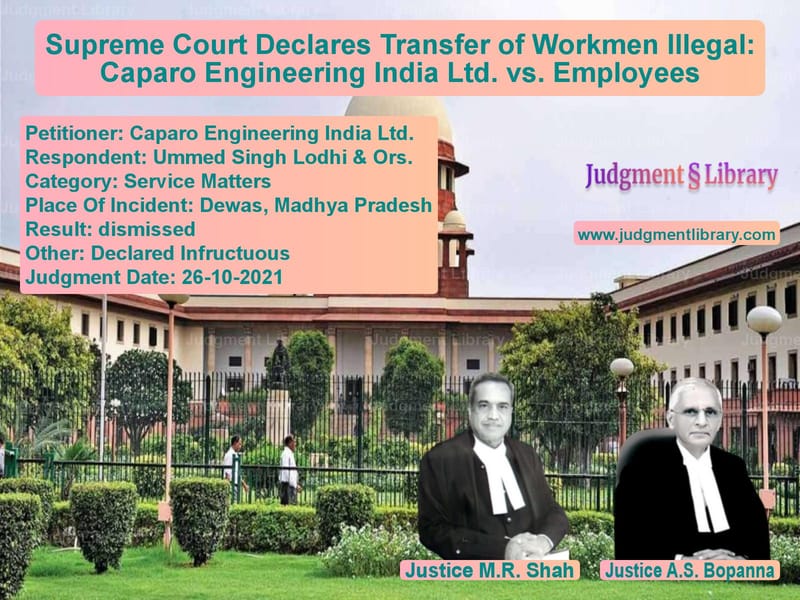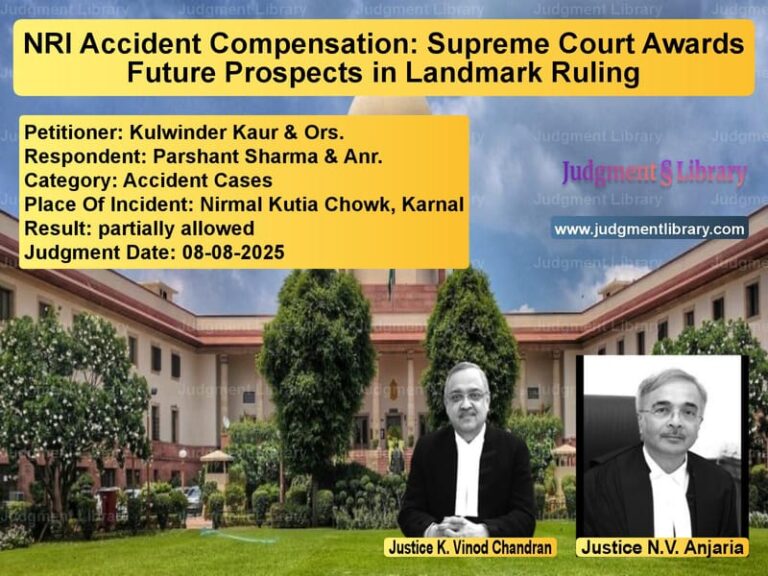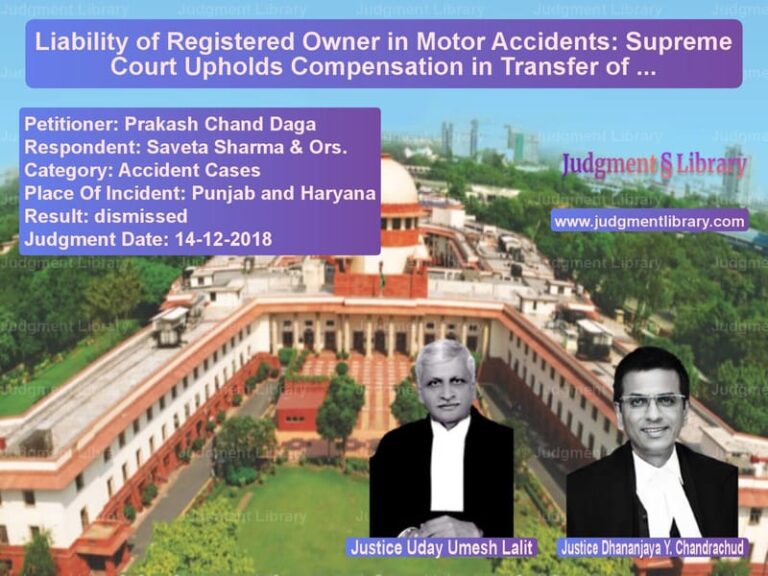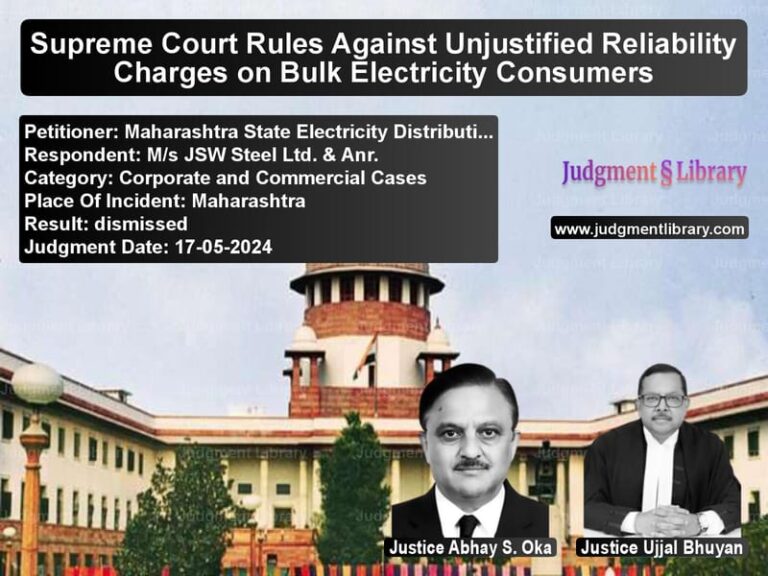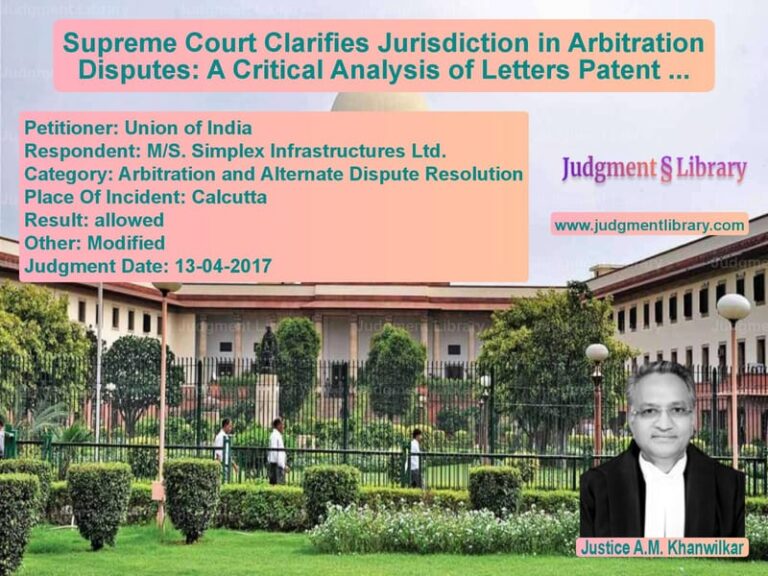Supreme Court Declares Transfer of Workmen Illegal: Caparo Engineering India Ltd. vs. Employees
The Supreme Court of India recently delivered a crucial judgment in the case of Caparo Engineering India Ltd. vs. Ummed Singh Lodhi & Ors., wherein the Court upheld the decision of the Labour Court and the Madhya Pradesh High Court, declaring the transfer of certain workmen illegal and in violation of Section 9A of the Industrial Disputes Act, 1947. The ruling reinforced protections for employees against arbitrary transfers that affect their service conditions.
Background of the Case
The dispute originated when Caparo Engineering India Ltd. transferred several employees from its Dewas factory in Madhya Pradesh to Chopanki, Rajasthan, which is nearly 900 kilometers away. The affected employees challenged the transfer, claiming that it was mala fide, arbitrary, and in violation of labor laws.
The employees, through their union, raised an industrial dispute, and the matter was referred to the Labour Court, Dewas. The Labour Court ruled in favor of the employees, declaring the transfer orders illegal. The employer then moved the Madhya Pradesh High Court, which dismissed their petition. Subsequently, Caparo Engineering appealed to the Supreme Court.
Read also: https://judgmentlibrary.com/supreme-court-upholds-union-of-indias-decision-on-ias-cadre-allocation/
Petitioner’s Arguments (Caparo Engineering India Ltd.)
Caparo Engineering, the appellant, argued that:
- The transfer was a management decision made in response to declining production at the Dewas factory.
- The transfer was within the service conditions of the employees and did not violate the Industrial Disputes Act.
- The Labour Court and High Court failed to consider that transfers are a normal business practice and essential for operational efficiency.
- The findings that the transfer was an unfair labor practice were incorrect.
Respondent’s Arguments (Employees)
The employees countered the claims of the employer, arguing that:
- The transfer orders were issued to force them to resign rather than being a genuine business necessity.
- Many of the transferred employees were nearing retirement, making relocation impractical and unjust.
- The employer failed to demonstrate a valid reason for shifting them from Dewas to Chopanki.
- Under Section 9A of the Industrial Disputes Act, any change in service conditions requires prior notice, which was not given.
- The work performed at Dewas was different from that at Chopanki, and the transfer would alter their job roles, violating labor laws.
Supreme Court’s Analysis
The Supreme Court considered two primary legal issues:
1. Was the Transfer in Violation of Section 9A of the Industrial Disputes Act?
The Court held that the transfer of employees from Dewas to Chopanki amounted to a significant change in their service conditions, triggering the requirements of Section 9A. Since no notice was issued before implementing the transfer, the Court found it unlawful.
The judgment stated:
“The transfer of workmen, particularly those at the fag end of their service career, without due notice under Section 9A, amounts to an unfair labor practice and is in contravention of statutory provisions.”
2. Did the Transfer Amount to Victimization?
The Court noted that transferring employees nearing retirement to a distant location with inadequate facilities suggested an intention to pressure them into leaving their jobs. This was considered an act of victimization and unfair labor practice.
The judgment observed:
“The transfer orders appear to have been issued with the motive of forcing employees to quit rather than as a legitimate operational requirement.”
Judgment and Conclusion
The Supreme Court dismissed the appeals of Caparo Engineering India Ltd. and upheld the judgments of the Labour Court and the High Court. The Court ruled that:
- The transfer orders were illegal and in violation of Section 9A of the Industrial Disputes Act.
- The employer must reinstate the affected employees at Dewas and pay them all back wages and benefits.
- The company must comply with labor laws and cannot use transfers as a means of coercion.
- Each employee is entitled to Rs. 25,000 in compensation.
This judgment serves as a precedent in cases of industrial disputes where transfers are used as a means to circumvent labor protections. It reinforces the rights of employees and ensures that companies must follow due process before altering service conditions.
Judges: The judgment was delivered by M.R. Shah and A.S. Bopanna.
Petition Result: Dismissed
Petitioner Name: Caparo Engineering India Ltd..Respondent Name: Ummed Singh Lodhi & Ors..Judgment By: Justice M.R. Shah, Justice A.S. Bopanna.Place Of Incident: Dewas, Madhya Pradesh.Judgment Date: 26-10-2021.
Don’t miss out on the full details! Download the complete judgment in PDF format below and gain valuable insights instantly!
Download Judgment: caparo-engineering-i-vs-ummed-singh-lodhi-&-supreme-court-of-india-judgment-dated-26-10-2021.pdf
Directly Download Judgment: Directly download this Judgment
See all petitions in Employment Disputes
See all petitions in Transfers Cases
See all petitions in Public Sector Employees
See all petitions in Judgment by Mukeshkumar Rasikbhai Shah
See all petitions in Judgment by A. S. Bopanna
See all petitions in dismissed
See all petitions in Declared Infructuous
See all petitions in supreme court of India judgments October 2021
See all petitions in 2021 judgments
See all posts in Service Matters Category
See all allowed petitions in Service Matters Category
See all Dismissed petitions in Service Matters Category
See all partially allowed petitions in Service Matters Category

